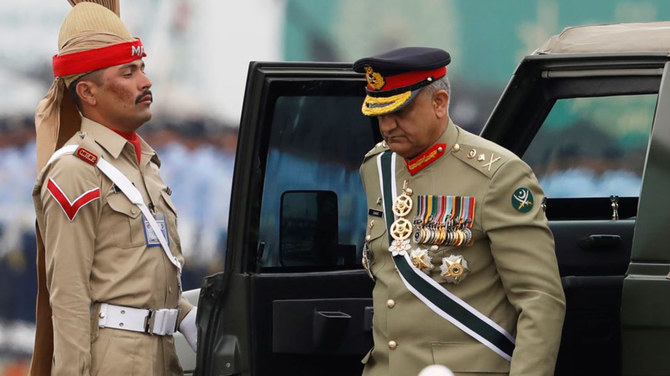ISLAMABAD: The federal government has constituted a three-member committee to negotiate with the opposition and draft legislation for the extension in the army chief’s tenure.
The committee, comprising Foreign Minister Shah Mahmood Qureshi, Defense Minister Pervaiz Khattak, and Minister for Planning Asad Omar, will also debate the new legislation in the parliament.
“We will introduce constitutional reforms with the help of the opposition,” Khattak said while talking to media in Peshawar on Sunday.
The Supreme Court suspended the government’s notification of August 19 that gave a three-year tenure extension to army chief Gen Qamar Javed Bajwa, citing procedural flaws on November 26.
The court gave a temporary six-month extension to the retiring army chief whose tenure ended on November 28, instructing the government to draft the requisite legislation within this period.
Pakistan’s civilian governments have granted extension in service to only two army chiefs – General Ashfaq Parvez Kayani and General Qamar Javed Bajwa – for their ‘meritorious services’ and this instilled a new strength in the force for their popularity in the rank and file, defense analysts said on Sunday.
Gen. Kayani was granted a three year service extension in 2010 after completion of his initial three year term in the office by the then Prime Minister Yousaf Raza Gilani in a bid to continue military operations against militants in the country’s tribal areas bordering Afghanistan. He retired in November 2013 after completion of six years in the office.
Prime Minister Imran Khan granted three year service extension to Gen Bajwa for “regional security environment,” but it didn’t go as smooth after the apex court took suo moto notice of the action.
“This is for the first time that service extension to an army chief has been thoroughly discussed in the apex court, and this will hopefully plug legal loopholes now after the legislation,” Lt General (retd.) Amjad Shoaib told Arab News.
Giving a background to the matter, he said that President Zulfikar Ali Bhutto constituted a high-powered committee after 1971 war with India to reorganize the command structure of the armed forces including the army, navy and air force.
“The committee had fixed the services chief’s tenure to three years and corps commanders to four years,” Gen Shoaib said, “this has been followed religiously up till now, though no written rules exist for it.”
About reaction in the army on extension in service, he said that a couple of ‘senior most generals’ aspiring to be the next army chief might feel bad, but “as per tradition and discipline of the force, they never express their feelings openly.”
“The strength of this army is discipline and loyalty to the command. This is unwritten and the whole training of the army revolves around this motto,” he said.
Pakistan army’s first native commander-in-chief General Ayub Khan remained in the office from 1951 to 1958. General Zia-ul-Haq (1976-1988) and General Pervez Musharraf (1998-2007) remained as the army chief’s for twelve and nine years respectively but, being the martial law administrators, had extended their tenures in the office themselves.
Concurring with General Amjad Shoiab, Dr. Hasan Askari Rizvi, a renowned political scientist and defense analyst, said the army chief’s service extension would augur well for both the institution and the country.
“Both the government and the opposition parties are willing to extend the army chief’s tenure, and a legislation regarding it will have a smooth sailing in the parliament,” he told Arab News.
Government forms three-member committee for army chief's tenure legislation
Government forms three-member committee for army chief's tenure legislation
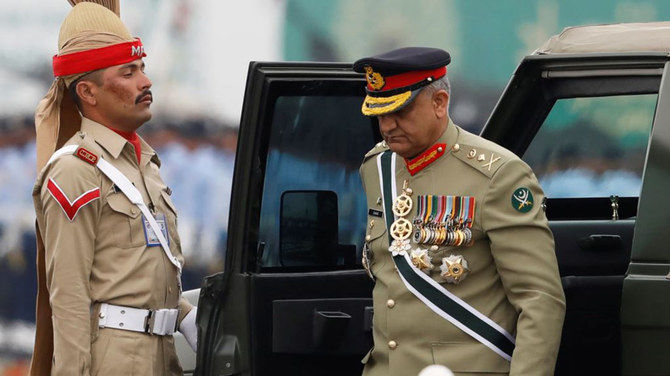
- Supreme Court gave the government six months to draft legislation for extension in an army chief’s tenure
- Army chief’s service extension would augur well for both the military and the country, defense analyst says
Pakistan vows legal job pathways abroad as bodies from Morocco boat tragedy arrive in Islamabad

- Chaudhry Salik Hussain says government signing agreements with other states for legal migration means
- Pakistan said 13 bodies from January 16 boat tragedy had been identified following verification process
ISLAMABAD: A senior Pakistani minister said on Wednesday night the government was working to set up legal means for the youth to go abroad and make a living after the bodies of four nationals who died in a boat capsizing near Morocco last month while trying to reach Europe arrived in Islamabad, according to state media.
The Pakistani government has made several arrests of suspected human smugglers in recent weeks after the boat carrying 86 migrants to Europe, including several Pakistanis, capsized on Jan. 16, according to the rights group Walking Borders.
Moroccan authorities said a day later that 36 people had been rescued, while Pakistan’s foreign office confirmed that 22 of them were its nationals. Pakistani officials said earlier this week that 13 bodies had been identified following an extensive verification process.
“I have no words to express my pain and feeling over this incident,” Federal Minister for Overseas Pakistanis and Human Resource Development Chaudhry Salik Hussain was quoted as saying by the Associated Press of Pakistan, as the bodies of the four Pakistani nationals arrived at Islamabad International Airport.
He said his ministry was working to create legal avenues for employment abroad to prevent such tragedies.
“Our ministry is creating many opportunities for the youth by setting up offices at the local level so that the middlemen mafia can be eliminated,” he added.
Hussain said the government was signing agreements with several countries to facilitate legal migration pathways and prevent human smuggling networks from exploiting desperate job seekers.
The latest boat disaster is part of a growing trend of dangerous sea journeys by migrants seeking to reach developed countries.
In June 2023, an overcrowded vessel sank in international waters off the Greek town of Pylos, killing hundreds of migrants, including 262 Pakistanis, in one of the deadliest Mediterranean shipwrecks on record.
More recently, five Pakistani nationals died in a shipwreck off the Greek island of Gavdos on Dec. 14.
The sea was once a blessing for the Pakistani city of Gwadar. But it’s become a curse

- In several areas near Gwadar, waves have swallowed up mosques, schools and settlements
- Authorities have built seawalls, but they are not enough to resolve the climate change issue
GWADAR, Pakistan: There was a time when few people in the coastal Pakistani city of Gwadar understood what climate change was. After a decade of extreme weather, many more do.
Rain battered Gwadar for almost 30 consecutive hours last February. Torrents washed out roads, bridges, and lines of communication, briefly cutting the peninsula town off from the rest of Pakistan. Homes look like bombs have struck them and drivers swerve to avoid craters where asphalt used to be.
Gwadar is in Balochistan, an arid, mountainous, and vast province in Pakistan’s southwest that has searing summers and harsh winters. The city, with about 90,000 people, is built on sand dunes and bordered by the Arabian Sea on three sides, at a low elevation that makes it vulnerable to climate change in a country that has already seen its share of catastrophe from it.
“It’s no less than an island nation situation,” warned Gwadar-based hydrologist Pazeer Ahmed. “Many low-lying areas in the town will be partially or completely submerged if the sea level continues to rise.”
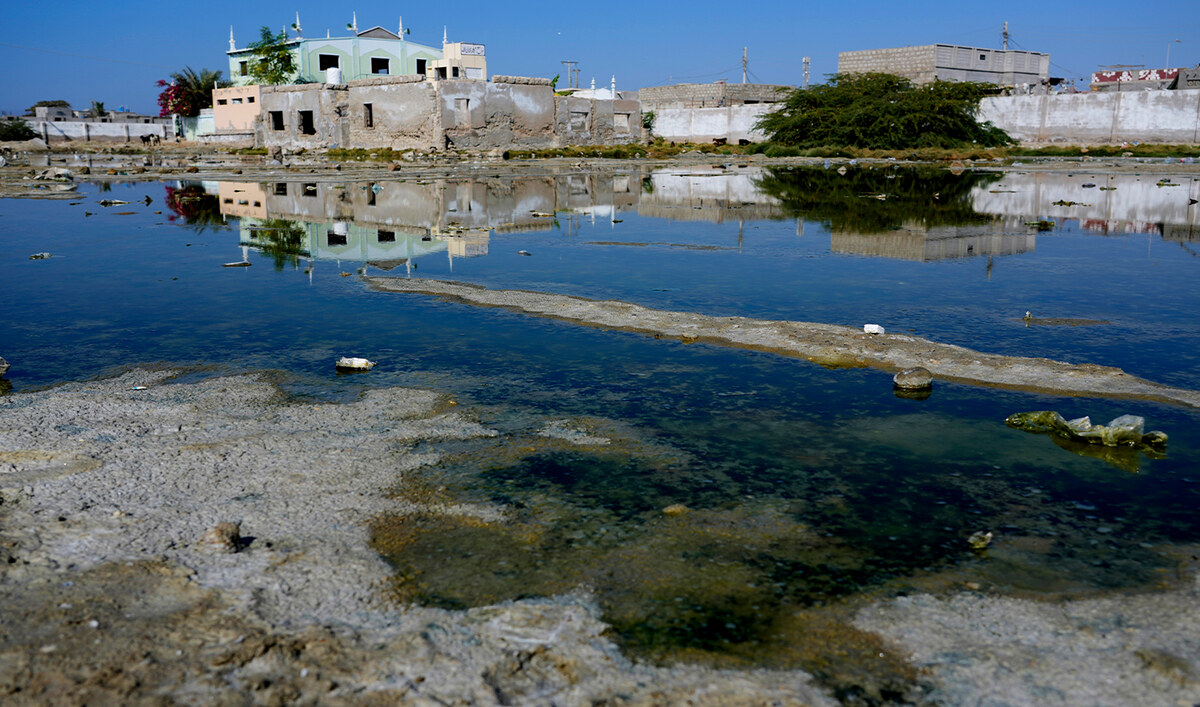
The sea, once a blessing for Gwadar’s fishing and domestic tourism sectors, has become an existential threat to lives and livelihoods.
Warming oceans mean bigger and more powerful waves, and those waves get whipped higher by summer monsoon winds. Warmer air holds more moisture — about 7 percent more per degree Celsius (4 percent per degree Fahrenheit) — and that means more big rain events.
“Waves have become more violent due to the rising sea temperatures and eroded beaches,” said Abdul Rahim, deputy environment director at Gwadar Development Authority. “The tidal actions and patterns have changed. Hundreds of homes have been washed away. It is very alarming.”
Melting glaciers contribute to rising sea levels, another cause of coastal erosion. The sea level at Karachi rose almost 8 inches (almost 20 centimeters) between 1916 and 2016, according to data from the National Oceanic and Atmospheric Administration. It’s projected to rise another half-inch (about 1.3 centimeters) by 2040.
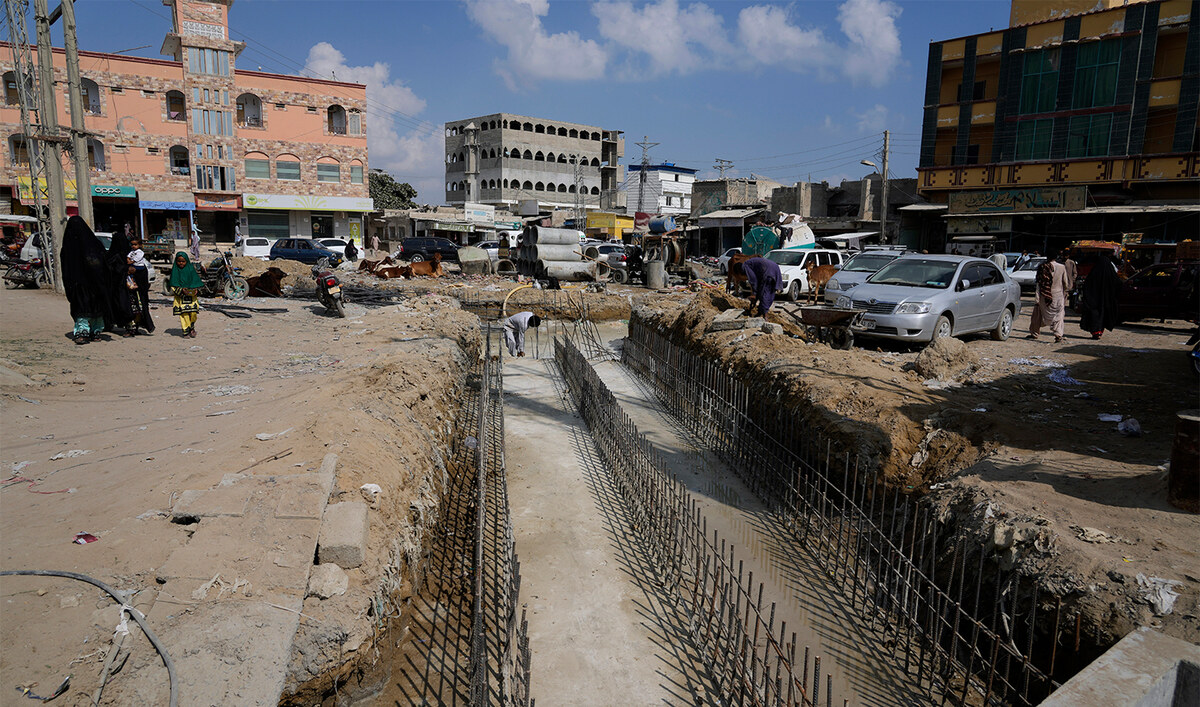
In areas near Gwadar, like Pishukan and Ganz, waves have swallowed up mosques, schools, and settlements. There are gashes in the cliffs at the popular picnic spot of Sunset Park, and rocks have cascaded onto the shore. Beaches run flat for dozens of kilometers because no structures remain on it.
Authorities have built seawalls from stone or concrete to hold back saltwater intrusion. But they’re a small solution to a massive problem as Gwadar’s people and businesses are fighting climate change on different fronts.
Saltwater pools on government land, salt crystals glistening in the sunshine. In the Shado Band neighborhood, former local councillor Qadir Baksh fretted about water seeping up through the ground and into his courtyard every day, held at bay only by regular pumping. Dozens of houses have the same problem, he said.
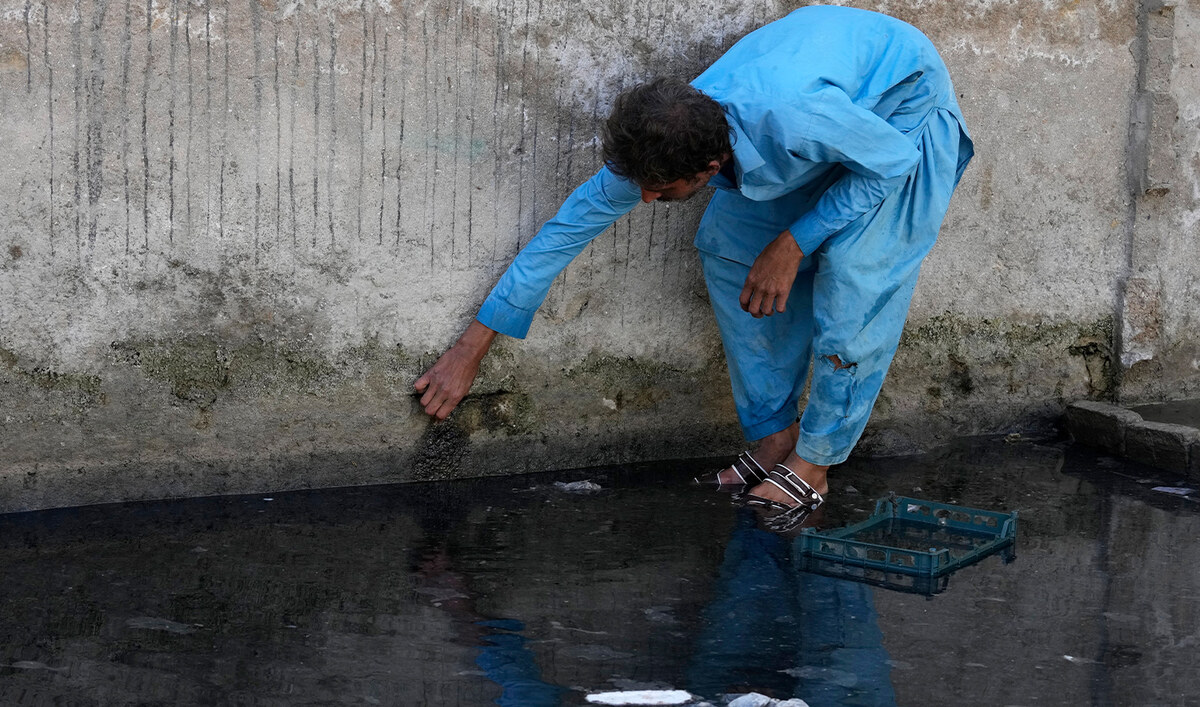
Officials, including Ahmed and Rahim, said changes in land use and unauthorized building are worsening flooding. Locals said some major construction projects have destroyed traditional drainage pathways.
Gwadar is the centerpiece of a massive Chinese-led initiative to create an overland route between its western Xinjiang region and the Arabian Sea through Gwadar. Hundreds of millions of dollars have poured into the town to create a deep seaport, an international airport, expressways and other infrastructure. The more sensitive projects, especially the port, are tightly secured by the Pakistani military, out of sight and off-limits to the public.
But there is no proper sewage or drainage system for residents despite a decade of foreign investment, and Gwadar’s porosity, high water table, rising sea levels, and heavier rainfall are rocket fuel for the town’s vulnerability.
There’s nowhere for the water to go.
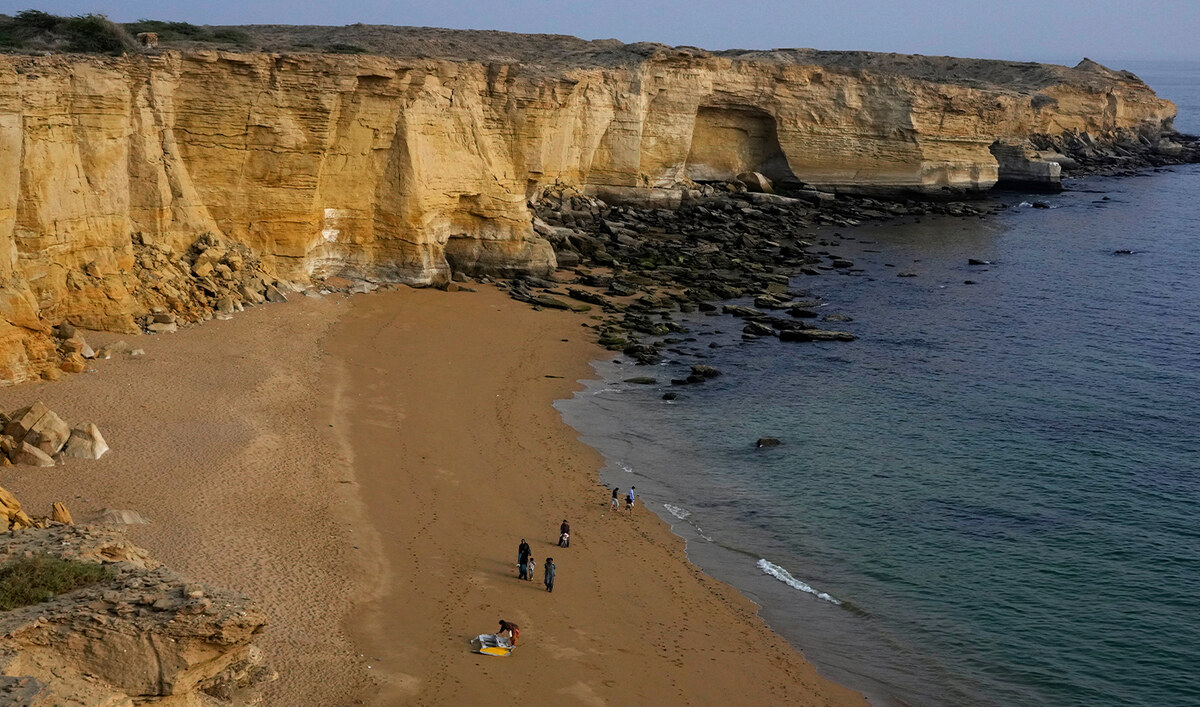
“In the past when it rained, the water disappeared up to 10 days later,” said Baksh. “But the rain that came last year hasn’t gone. The water rises from the ground with such speed it will reach the four walls of my home if we don’t run the generator every day to extract it. Officials say it’s because of climate change but, whatever it is, we’re suffering.”
Gwadar’s fishing community is also hurting. Catches are smaller, native fish are disappearing, and migration patterns and fishing seasons have changed, said Ahmed and Rahim. There is also algae bloom and the invasion of unwanted marine species like pufferfish.
Illegal fishing and foreign trawlers are responsible for a few of these things, but it’s mostly rising sea temperatures.
People have migrated from places like Dasht and Kulanch because of water scarcity. What agriculture there was in Gwadar’s surrounding areas is vanishing due to loss of farmland and livestock deaths, according to locals. It’s part of a wider pattern in which Pakistan’s farmers are seeing declining crop yields and increasing crop diseases due to climate extremes, particularly floods, droughts and heat waves, according to the United Nations’ Intergovernmental Panel on Climate Change.
“There are heat waves and dust storms in Gwadar,” said Ahmed. “But the main impact of climate change here is that there is too much water and not enough of it. If nothing is done to address this problem, we will have no option but to retreat.”
Pioneering Pakistan woman MMA fighter breaks barriers ... and arms

- Anita Karim comes from Gilgit-Baltistan and is nicknamed ‘the arm collector’ due to her fierce performances
- She originally trained in taekwondo and jiu-jitsu before discovering MMA at high school in Islamabad
ISLAMABAD: Growing up in the rugged northern reaches of Pakistan, Anita Karim honed her combat skills fighting with three older brothers who pulled no punches.
The bruising experience prepared her for a career in Mixed Martial Arts (MMA) — blending Thai kickboxing, Japanese judo and wrestling — and she is now the nation’s pre-eminent woman fighter.
“The village where I come from, they support women fighters,” she told AFP. “But when I started MMA, they had no awareness of this sport.”
“They said it’s a men’s game exclusively and a woman cannot do that one,” the 28-year-old said.

Eight years ago she won the right to enter the ring, swiftly becoming Pakistan’s first internationally competing woman MMA fighter and appearing in Asia’s biggest promotion, ONE Championship.
“Now misogynistic comments and criticisms have stopped,” she said at her gym in the capital Islamabad, where she trains without heating in the octagonal “cage” where fighters face off.
It is unusual for women to take up sport in deeply conservative Pakistan, where it is often forbidden by families.
But Karim’s native Gilgit-Baltistan region — where female modesty codes are more relaxed — has become an incubator for women’s sport.
In October, two sisters from the region, Maliha and Maneesha Ali, brought back gold and bronze from a taekwondo competition in Indonesia.
Karim’s brother Uloomi, who became her coach after being on the receiving end of her blows, said support began at home.

“When she showed the commitment, the dedication, we knew that she was going to make it,” said the 33-year-old, standing in their family-owned gym.
“We knew that she could take it and we did not have any issues with her training with any guy.”
Surprisingly timid outside the ring, Karim is at the head of a cohort of Pakistani female MMA fighters — five from Gilgit-Baltistan, according to the regional government.
“She’s shy, but when she enters the cage, it’s completely different,” said Uloomi, who has also competed in the sport.
Her speciality is the armlock, deployed with an agonizing all-body grip, which aims to force an opponent to “tap out” in submission before bones are broken or joints wrecked.
In 2022 she was pictured atop a podium in Pakistan with two opponents wearing slings on their injured arms — a performance that earned her the nickname “the arm collector.”
“They could have tapped to stop the fight, but they didn’t, so I went through with it,” she said.

In her hometown, Karim originally trained in taekwondo and jiu-jitsu before discovering MMA at high school in Islamabad — to the consternation of her community back home.
“A lot of people close to me criticized me, but that’s part of the game. Now they know how it works,” she said.
The message emanating from her hometown now is one of pride.
“The way she has made the name of Gilgit-Baltistan and all of Pakistan shine on the international level, serves as a lesson,” said the regional government’s sports chief Shah Muhammad.
After losing on her professional debut in 2018, where the referee refused to let her fight unless she raised her leggings above the knee, she moved to Thailand to train at an MMA academy.
She now earns a living from competition prizes, modest government grants and coaching at her Islamabad gym.
When she returns after competitions, small crowds gather to greet her at the airport and she is followed by a fledgling community of female fighters.
They too want to turn professional in a nation where only one in five women have jobs, according to United Nations figures.
“Anita is a role model for us,” said Bushra Ahmed, a few years Karim’s junior and out of breath as she trains alongside her, another woman and a dozen men.
Karim also wants to “give Pakistani women confidence and self-defense techniques,” with over 80 percent having been victims of public harassment, according to the UN.
Recently she “hit a man who was harassing me in a market in Islamabad,” Karim said.
“He left with his face stained with blood.”
Pakistan eyes tech-driven export growth as local firms join AI event in UAE

- AI Everything Global 2025 is one of the largest public-private artificial intelligence gatherings of the year
- Eleven Pakistani companies and two start-ups are attending the event featuring several global tech giants
ISLAMABAD: Pakistan is participating in AI Everything Global 2025, a major artificial intelligence event in the United Arab Emirates, with hopes of leveraging technology to drive a significant jump in exports, its ambassador said on Wednesday.
AI Everything Global 2025 is one of the largest public-private AI gatherings of the year, bringing together over 500 exhibitors and 150 investors from 70 countries. The event, which began in Abu Dhabi on February 4 and continues in Dubai from February 5-6, serves as a platform for industry leaders, governments and innovators to explore AI’s impact on economic transformation.
It features global tech giants including ASUS, IBM, Zoom, Oracle and Intel presenting cutting-edge AI solutions.
Pakistan has made its presence felt at the event with a delegation of over 30 industry leaders, backed by the Pakistan Software Export Board (PSEB) and the Trade Development Authority of Pakistan (TDAP). The Commercial Section of Pakistan’s Consulate in Dubai is facilitating participation, which aims to strengthen Pakistan’s AI footprint and explore collaborations in the growing digital economy.
“There are 11 Pakistani companies and two start-ups [attending the event],” Ambassador Faisal Niaz Tirmizi said. “There are 30 delegates, and it’s a great opportunity [for them].”
“I always say if we harness technology, because the world depends on technology, our total [Pakistani] exports are $30 billion, and we can export even more through technology,” he added.

The potential of Pakistan’s tech industry was also highlighted by Abu Bakar, CEO of PSEB, who said the country was making strides in IT exports.
“We have just started,” he said. “Our [IT] export was $3.2 billion last year. I think we have a lot of aspirations. God willing, this year [the IT export] will be more than $4 billion.”
“We have to go up to $15 billion,” he continued. “For that, everyone has to work together for brand Pakistan and tech destination Pakistan. And we feel very happy to see that our companies get a lot of recognition here [in the UAE].”
The event comes as AI is projected to contribute $100 billion to the UAE’s GDP by 2030, aligning with the country’s National Strategy for Artificial Intelligence 2031 and its ambition to become a global AI leader.
Pakistan’s participation reflects its efforts to integrate AI into its economy, upskill its workforce and expand the country’s digital exports.
UN agencies express concern over Pakistan’s directive for Afghan nationals to leave capital

- UNHCR and IOM say forced return of Afghans to their home country can place them at increased risk
- They say Pakistan has arrested over 800 Afghan nationals from Islamabad and Rawalpindi since Jan. 1
ISLAMABAD: The United Nations Refugee Agency (UNHCR) and the International Organization for Migration (IOM), which operates under the UN system, on Wednesday voiced concern over Pakistan’s directive requiring Afghan nationals to relocate from Islamabad and Rawalpindi or face deportation, urging authorities to consider human rights standards in implementing the policy.
Last year, the Pakistani government announced that Afghan citizens residing in the federal capital would require No Objection Certificates (NOCs) after saying that many of them participated in an anti-government protest launched by former Prime Minister Imran Khan’s opposition Pakistan Tehreek-e-Insaf (PTI) party.
The development came months after Pakistan launched a deportation drive, citing security concerns, with officials arguing that Afghan nationals had been linked to militancy. However, the Taliban-led administration in Kabul contended that Afghan refugees were being scapegoated and insisted they were not responsible for Pakistan’s security issues.
The UNHCR and IOM said Pakistani authorities have arrested and deported over 800 Afghan nationals from Islamabad and Rawalpindi since January 1, including women and children, further raising concerns among humanitarian organizations. They said they were seeking clarity over the modality and timeframe of Afghan relocation.
“Pakistan has a proud tradition of hosting refugees, saving millions of lives,” Philippa Candler, the UNHCR representative, noted. “This generosity is greatly appreciated.”
“Forced return to Afghanistan could place some people at increased risk,” she added. “We urge Pakistan to continue to provide safety to Afghans at risk, irrespective of their documentation status.”
A UNHCR-issued non-return advisory has been in place since 2021, calling for a suspension of forced returns of Afghan nationals from any country, regardless of their status.
UNHCR and IOM have emphasized the need for a mechanism to register and screen Afghan nationals in Pakistan to provide tailored solutions, including international protection for those in need and legal pathways for individuals with strong socioeconomic and family ties in the country.
“IOM is committed to work with the Government of Pakistan and UNHCR to develop a mechanism to register, manage and screen Afghan nationals in Pakistan,” said IOM Chief of Mission, Mio Sato. “This will open the door to tailored solutions, including international protection to those in need and pathways for Afghan nationals, with long-standing socioeconomic and family ties in the country.”


